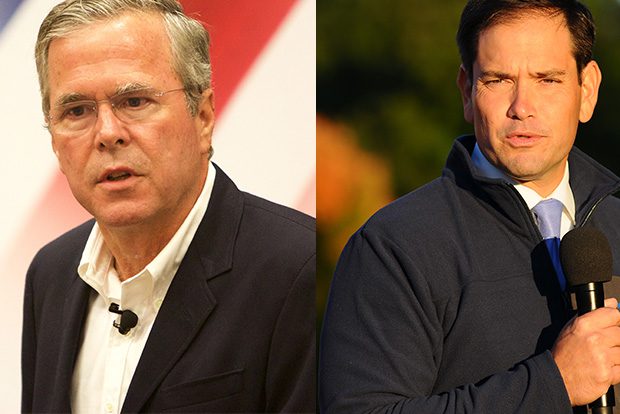Rubio and Bush’s Foreign Policy Debate Errors

Dan Drezner gives Bush and Rubio too much credit for their performances last night:
By my count, only two candidates didn’t say anything flatly wrong about foreign policy the whole night: Jeb Bush and Rubio.
When Bush’s opening statement says that the U.S. has “to destroy ISIS before it destroys us,” that’s a pretty ridiculous piece of threat inflation right off the bat. Looking through Bush’s other statements, I found there were some other sketchy and false claims. For instance, Bush said this:
The refugee issue will be solved if we destroy ISIS there, which means we need to have a no-fly zone [bold mine-DL], safe zones there for refugees and to build a military force.
Readers will notice that the things Bush lists have nothing directly to do with destroying ISIS, and the first one is necessarily aimed at regime and Russian forces. Bush may imagine that this will somehow lead to the later destruction of ISIS, but on its face this makes no sense. A more glaring factual error was Bush’s claim about the state of the world:
[Obama] creates an environment that now we’re creating the most unstable situation we’ve had since the World War II era [bold mine-DL].
Some might be tempted to dismiss this as boilerplate nonsense that hawkish candidates say all the time, but that doesn’t make it any less ridiculous or false. Far from being “the most unstable situation” since WWII, the world is generally more stable and suffers from less violent conflict than it has in decades. Practically every decade after WWII before this one has been more unstable and violent, so it takes an exceptionally clueless–or dishonest–candidate to argue the opposite.
As for Rubio, Matt Purple picked up on one of his more egregious errors made during the debate. Like many an Iraq war dead-ender, Rubio claimed that toppling Hussein was the cause of Gaddafi’s decision to agree to shut down his WMD programs. Purple explains why this is wrong:
The Florida senator claimed that Muammar Gaddafi relinquished his weapons of mass destruction because we invaded Iraq—not so; deposing Saddam almost derailed existing negotiations with Gaddafi.
More to the point, the negotiations with Libya began years before the build-up to the invasion, and as Paul Pillar has explained more than once the invasion was not what persuaded Gaddafi to agree:
In fact, the Libyan ruler’s dramatic turnabout, in which he gave up his involvement in international terrorism and instead became a counterterrorist partner of the West, as well as giving up his unconventional weapons programs, had begun years earlier. Qadhafi was responding to the pressure and ostracism of multilateral sanctions and to the prospect of an improved international standing if he came clean about the bombing of Pan Am 103 and was willing to deal seriously with the United States on the issues of most concern to the United States. The secret negotiations that confirmed and codified all this were begun in 1999, under the Clinton Administration. It was the willingness of the United States to engage Qadhafi’s regime that made this all possible, not some prospect that military force would be used to remove him—let alone, as with the ouster of Saddam, that force would be used to oust him no matter how he tried to adjust his policies.
It is typical of Rubio to rely on a common hawkish talking point when giving an answer, but it is even more telling that he tries to credit the Iraq war debacle with producing a nonproliferation success in Libya that actually came about through the sort of diplomacy that he loathes. Iraq war supporters have been trying to push this lie for the last decade to distract attention from the fact that the “preventive” war in Iraq was both unnecessary and directly harmful to the cause of nonproliferation, and Rubio is just the latest to repeat that false story.
Purple also notices that Rubio misrepresented the reason why Arab states have withdrawn their forces from the fight against ISIS:
He also said our Sunni allies in the Middle East weren’t launching airstrikes against ISIS because “they have lost complete trust in this president”—actually, they’re too busy bombing Yemen, a war President Obama supports.
Rubio presumably didn’t mention this because this is a war he is on record supporting the war, too, but he may not want to advertise the fact that he endorses an Obama administration policy. Or perhaps he is embarrassed to draw attention to the fact that he has supported yet another disastrous and unnecessary war in the region. Regardless, both Bush and Rubio made several errors on foreign policy last night, some of them were quite significant, and they shouldn’t be overlooked.
Comments